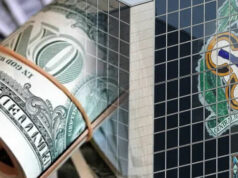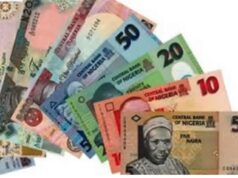 gistlover.com
gistlover.com
Naira may be on course to regain N1000/$ (an exchange rate though implausible as early as a month ago) in the near time if the current bullish outlook of the market is sustained.
From regulatory directive to market intelligence, it already looks like a fair-weather week for the local currency, which has recorded over 50 per cent gain against the dollar from its high-time low in February.
On the regulatory side, two directives, aimed at unlocking more liquidity into the market, were released yesterday.
Both circulars, market analysts, are optimistic could trigger the dumping of foreign currencies by remnant speculators, who are still holding on the tread, in the coming days.
First, the Central Bank of Nigeria (CBN) informed the Bureau de Change operators (BDCs) of the sale of $10,000 to each BDC at a rate of N1,101/$1.
If the eligible 1,588 BDCs, which the Central Bank attached to the circular, are funded, the weekly sale will increase supply in the retail market by $15.88 million. The operators were to submit documentation for disbursement from yesterday with the dealer sternly warned to abide by the rules.
But the real impact of the amount could come in the form of panic sales of dollars that will follow the announcement in the next few days.
With the operators expected to give to end users at a ceiling of 1.5 per cent margin, the dealers are not expected to sell above N1,117/$.
Hours after the announcement was made, the market started pricing in panic sale as the dollar dropped to about N1210/$ in Lagos where foreign exchange trading has become a buyer’s market.
“We write to inform you of the sale of $10,000 by the Central Bank of Nigeria (CBN) to BDCs at the rate of N1101/$1.
“The BDCs are in turn to sell to eligible end users at a spread of not more than 1.5 per cent above the purchase price,” the circular said.
This would be the third sale of FX to BDCS after the Godwin Emefiele interregnum, which followed the freezing of the BDC segment in 2021. The suspension was lifted some weeks ago with the apex bank rejigging the operating template.
The CBN had sold $20,000 to each BDCS at the rate of N1,301/$ in its first tranche. In the second series, the amount was reduced to $10,000 but at the rate of N1,251/$.
The sale appears to be a new subsidy, a haircut the CBN may have taken to restore stability in the market and increase liquidity.
The market rate, in the past weeks, has been lower than CBN’s stipulation. For instance, whereas the CBN had given BDCs a headroom of N1,267.67/$ in the last two week’s sales, the dollar had been trading around the N1250/$ band.
That suggests that the CBN discounted rate was higher than the black-market rate. If the same trend, fuelled mainly by panic sales, continued into the week, the dollar may exchange around N1100/$.

[FILES] Bureau de change. PHOTO: QZ
Its current rate is lower than the three-month moving average (MA), according to data tracked by The Guardian. Some experts said the downward movement of the dollar against the naira is becoming entrenched – a suggestion that the local currency crisis could be out of the woods.
However, the downside to currency stability is the likelihood of running out of firearms. The campaign seems to have started impacting the foreign reserves, which rallied to almost $34.45 billion around the middle of last month. From March 18 to last week, the reserves lost about $1.1 billion, falling to $33.36 billion as of last weekend.
The recovering naira may gain significantly from returning investment and other fresh injections. For instance, Bloomberg reported yesterday that the country will, at the end of next month, receive $1.05 billion from a syndicated loan backed by oil. The fund is part of the $3.3 billion prepayment facility arranged by the African Export-Import Bank for the Nigerian National Petroleum Company Limited.
The policy also saw the regulator suspending the use of foreign currency-denominated collaterals for naira loans.
At press time, it was not clear whether the move would support the cause of stabilising the naira and unlocking FX liquidity. However, some experts suggested it could help to reduce official abuse of the naira and reduce rent-seeking behaviours.
The bank has given banks 90 days to wind down such collaterals, as the CBN warned that there would be stiff penalties for failure to do so.
The circular, addressed to the banks, said the current practice of using foreign currency-denominated collaterals for naira loans was henceforth prohibited, except, where the foreign currency collateral is Eurobonds issued by the federal government or guarantees of foreign banks, including standby letters of credit.
The circular which was signed by Acting Director of Banking Supervision, Adetona Adedeji, noted: “In this regard, all loans currently secured with dollar-denominated collaterals other than as mentioned above should be wound down within 90 days, failing which such exposures shall be risk-weighted 150 per cent for capital adequacy ratio computation, in addition to other regulatory sanctions. ”
Dozens of multinational companies, who are known for pledging foreign currency-denominated collaterals for domestic loans, may in the coming weeks, be asked to renegotiate their loans. The calls could stress-test banks’ relationship with many of the multinational companies, The Guardian understands.
Since banks are not custodians of loan collaterals and could not have warehoused them, it is not clear how winding down the window would support the reforms of the FX market.
Yet, there are indications the policy is forward-looking and aims at reducing the tendencies to take a position against the naira and rein in the fast-growing money supply in the domestic economy.
An investment banker, David Adonri, told The Guardian, yesterday that the policy is myopic and could unnecessarily constrict the economy. He, however, said it could make a material difference “for the CBN to have come up with the policy”.
“If the credit is properly perfected, it means the lender can foreclose the collateral in case of default,” Adonri explained, insisting that foreign currency-denominated assets are perfect collaterals and even more superior in many cases.
With the naira gaining more value daily, the new policy may be a proactive policy action to reduce the risk exposure of the banks and prevent under-securitisation of their loan assets.
The CBN churned out a series of policies to wean banks off diverse currency-related risks since Yemi Cardoso took the reins with yesterday’s policy being the latest of such policies.




















































